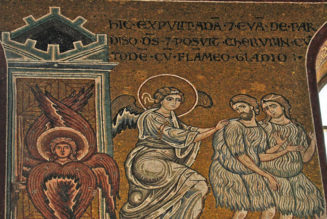
Betrayed Without a Kiss: Defending Marriage after Years of Failed Leadership in the Church
By John Clark
(TAN Books, 304 pages, $30)
Marriage is falling apart in the West, even among so-called professing conservative Christians across the denominational spectrum. So, how are Roman Catholics doing? And how well is their Church — its hierarchy, tribunals, pre-marital preparation programs, and so on — supporting its historic matrimonial teaching and practice? According to John Clark, a “columnist, political speechwriter, and ghostwriter” with “two books on fatherhood” and “approximately five hundred articles and blogs about Catholic family life and apologetics” under his belt, the answers are “not well at all” and “abysmally.”
Clark opens this readable and thoroughly researched book with a Catholic vision of marriage as originally created by God and as it may have been lived out in Eden. He introduces readers to the roots of historical Catholic teaching on matrimony as an indissoluble sacrament with a distinct design and purposes focused on the procreation and nurture of children. This explication of Catholic marital doctrine is also fleshed out in Clark’s treatments of what he regards as various heresies and errors, most notably in discussions of heroic figures such as John Fisher, the Council of Trent, various papal encyclicals, and more. (READ MORE from David Ayers: Sociology Professors Defend Hamas Butchery)
As one might expect of a very conservative Roman Catholic educated at Christendom College, after acknowledging the many excesses and compromises of Catholicism related to marriage around the time Protestantism emerged, he attacks in the strongest possible terms, and in turn, Henry VIII and his obsessive quest to keep marrying until he could get a son whether or not it wrecked the Church, Martin Luther, and Protestantism in general. Core to these are debates about the sacraments, divorce, the marital roles of Church versus civil authorities, the Apocrypha, and even polygamy.
Clark’s attention then turns to the “Assault from Without,” that is, the way modern society undermines marriage at every turn. This includes our views on “irrelevant fatherhood,” as well as no-fault divorce, the plague of pornography, and feminism, with brief mentions of artificial contraception, economic realities that discourage healthy marital practices, and same-sex marriage.
However, Clark mainly focuses on “The Assault from Within.” His discussion of these is wide-ranging, well-documented, and appropriately brutal. Here, we learn about brazen dissension from clear, established Catholic doctrines tolerated, again and again, by Church authorities. Major heresies and errors he addresses include the notorious Dutch Catechism, the Marxist infiltration of seminaries, the majority report of Pope Paul VI’s commission on contraception, the powerful and heretical influence of The Catholic University of America’s Charles Curran and his followers, including consequent corruption of Canon lawyers rooted in the institution’s monopoly on training the latter, and the terrible state of current practices of annulment tribunals and even Pre-Cana marital preparation. He also tackles the debates about admission to the Eucharist for divorced and remarried Catholics, including the degree to which Church teaching on this is both widely ignored and under official threat.
Clark and I are cobelligerents in a culture war in which the future of our common civilization hangs in the balance.
Given all of this, the statistics Clark provides about the plummeting numbers of Catholic marriages and the rising numbers of Catholic divorces are shocking, but not surprising. And what about declines in American Catholic annulments, which at one time were unbelievably rare but then skyrocketed? His answer here is entirely consistent with what social scientists point out about recent declines in divorce. That is, fewer Catholic marriages mean fewer annulments. Moreover, many Catholics who divorce no longer bother with annulments even if they plan to remarry.
Along the way, Clark treats us to some shocking facts, and several about annulments stood out. There was the ex-Catholic Episcopalian, same sex “married” priest openly serving on a Catholic annulment tribunal. Then, he discusses the extent to which members of said tribunals accept twisted notions of “defective consent” by which almost all marriages can be found to be invalid. Still another is the de facto requirement that Catholics must get divorced before seeking annulments, after which the fact of their divorce becomes a justification for granting nullity.
Clark closes the book with hope and concrete steps the Church, particularly American Catholics, must take to move forward. Some will make sense to any reader concerned with traditional marriage. Others (such as focusing more on the veneration of Mary and Joseph, or uses of the rosary) will be meaningful only to committed Roman Catholics.
So, what does a committed conservative Calvinist sociologist who has written extensively on Christian marriage — namely me — have to say about this very Catholic book on sacramental marriage and its demise? Simply, “This is an excellent book.”
Yes, I disagree with Clark in almost all of the areas he identifies that separate Rome from Geneva and Wittenburg on marriage. I found his treatment of Martin Luther harsh and unbalanced, though consistent with historic Catholic positions, for example, on the Council of Trent. Here, I recommend readers round out their reading of Clark with Edmund Morgan’s classic The Puritan Family, relevant chapters in Leland Ryken’s Worldly Saints, and, on Luther’s alleged endorsement of polygamy, Nathan Jastram’s thorough and by no means hagiographic analysis.(READ MORE from David Ayers: Presbyterianism Lost Its Clout When It Embraced Modernism)
Still, Protestants should not shy away from reading about some of the unseemly historical facts of Protestantism’s treatment of marriage, their consequences, and the historic viewpoints of conservative Catholicism about the same. Moreover, many if not most Protestants and professing Catholics do not really know much about Catholic teaching on matrimony (that latter a fact that Clark documents and decries). I cannot think of a book accessible to the lay reader that is better than this one for learning about the substance and history of Catholic marital doctrine, and threats to the same.
Moreover, readers like me who might react negatively against the portrayal of Protestantism in Betrayed Without a Kiss should consider just how much more attention Clark pays to the “Assaults from Within” that have led to “crises of confidence” in matrimony among Catholics, especially in America and other Western countries. Moreover, how much he joins serious Protestants in decrying the West’s wholesale abandonment of real marriage and with it, the terrible impact this is having upon our children. Moreover, many of his recommendations and observations about the threats to marriage and what we need to do about them are spot on. For example, his call to reconsider the role we give civil authorities in licensing marriage, in light of what this now practically means in an era of same sex marriage and soon-to-be polygamy, are now echoed by many faithful commentators in evangelical Protestant circles.
At the end of the day, despite our very real and important differences, Clark and I are cobelligerents in a culture war in which the future of our common civilization hangs in the balance. And so whether you are Protestant, Catholic, something else or none of the above, do yourself a favor and read this book.








